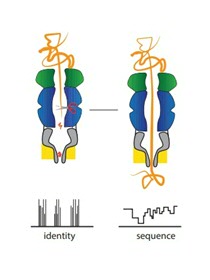Giovanni Maglia receives $1.5 million from National Institutes of Health for research into next-generation protein nanopores
Professor of Chemical Biology Giovanni Maglia of the Groningen Biomolecular Sciences and Biotechnology Institute (GBB) has received a grant of 1.5 million dollars from the National Institutes of Health (NIH), United States. The grant is part of the National Human Genome Research Institute Technology Development program and is intended for research into a new generation of protein nanopores.

Giovanni Maglia aims to design protein nanopores with advanced functionalities that will take on the next grand challenge of sequencing single proteins. In order to sequence proteins, the designed nanopores must unfold a target protein, control the speed of its transit across the nanopore and recognize individual amino acids. Using bioengineering, Maglia will develop complex nanopore-devices that unfold target proteins and feed the linearized polypeptide through the nanopore. There, single amino acids will be recognized by modulations of the current across the nanopore.
Maglia’s nanopores will be used to develop the first technology to sequence full-length single proteins. Compared to the state of the art ‘shotgun proteomics’, the nanopore approach will allow long polypeptide reads, recognition of low-abundance proteins, and real-time monitoring with minimal cost, time and sample preparation.
National Institute of Health and National Human Genome Research Institute
The National Institutes of Health (NIH) is the medical research agency from the United States. It is part of the Department of Health and Human Services. The National Human Genome Research Institute (NHGRI) funds research and conducts research on the role that the genome plays in human health and disease. A genome is an organism's complete set of DNA, including all of its genes.
Read more
- News item by our science center Science LinX: Nanopores suitable for single-molecule identification and sequencing of complete proteins
| Last modified: | 13 October 2022 1.14 p.m. |
More news
-
03 April 2025
IMChip and MimeCure in top 10 of the national Academic Startup Competition
Prof. Tamalika Banerjee’s startup IMChip and Prof. Erik Frijlink and Dr. Luke van der Koog’s startup MimeCure have made it into the top 10 of the national Academic Startup Competition.
-
01 April 2025
NSC’s electoral reform plan may have unwanted consequences
The new voting system, proposed by minister Uitermark, could jeopardize the fundamental principle of proportional representation, says Davide Grossi, Professor of Collective Decision Making and Computation at the University of Groningen
-
01 April 2025
'Diversity leads to better science'
In addition to her biological research on ageing, Hannah Dugdale also studies disparities relating to diversity in science. Thanks to the latter, she is one of the two 2024 laureates of the Athena Award, an NWO prize for successful and inspiring...
